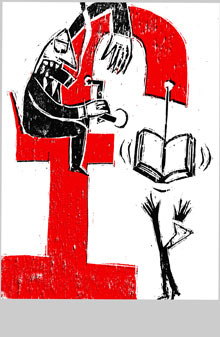Alicia Clegg in The FT
Caroline Barlow felt little emotion when she settled with the BBC last May and withdrew her employment tribunal claims over unequal pay and constructive dismissal. Just a crushing tiredness that left her shaky and sick and so disoriented that for a while she stopped driving.
She now views her reaction as a kind of grieving, for her job and faith in an institution that she had revered. She entered the BBC’s pay review process suspecting that she was paid less than male heads of product doing jobs similar to her own, and received a 25 per cent rise, though with little explanation of how the figure was arrived at. So she used data protection law to view internal documents that indicated that even after the increase she would still be paid less. The assessors argued, without providing evidence, that she had skills she still needed to develop and the men had bigger roles.
“Publicly the BBC was saying it had introduced a transparent process. Yet, it was made very clear to me that I’d only get salary information on my peers at a final tribunal hearing by court order,” she says.
Like the journalist Carrie Gracie, who also challenged unequal pay at the BBC, Ms Barlow talks of her sense of entering a no-man’s-land of stonewalling and doublespeak, where evidence that she presented was watered down or selectively reported. She says that a strategic project described as “transforming” in a business case, for which she obtained executive committee sign-off, was trivialised as “a hygiene project” after she questioned her pay. She felt blocked by the slow progress of her grievance — she only received the outcome on her final day of employment − undermined in numerous small ways and made to feel unimportant. She became ill and was diagnosed with depression.
Lawrence Davies, director of Equal Justice Solicitors, who acted for Ms Barlow, says such experiences are common. Most employers try to quash internal complaints to avoid exposing themselves legally, should the employee sue. Yet while employers uphold only 1 per cent of grievances, he says, 65-70 per cent of complainants who persevere to an employment tribunal ultimately win, though the strain can be immense.
Kathy Ahern, a retired mental health nurse and academic, studied the psychological toll of challenging an employer after discovering that nurses who reported misconduct had strong beliefs about what it means to be a nurse. When they faced reprisals for putting patients before other loyalties they suffered overwhelming mental distress, not just because of what was done, but because the institutional reality gave the lie to everything that nursing codes of conduct teach. Another study, published in the journal Psychological Reports in 2019, found levels of anxiety and depression among whistleblowers are similar to those of cancer patients.
Ms Ahern likens retaliatory employers to domestic abusers who psychologically manipulate or “gaslight” a partner to destroy their self-confidence and credibility. Tell-tale patterns, which she documents in a review paper published in the Journal of Perinatal & Neonatal Nursing in 2018, run the gamut from maliciously finding fault, to sustained campaigns of petty slights and obstructions, to seeding rumours that the victim is unhinged.
Tom Mueller, author of Crisis of Conscience: Whistleblowing in an Age of Fraud, believes that while employers sometimes label whistleblowers as “crazy” simply to tarnish them, this may actually be how they see them. To “more negotiable” colleagues who know when to bend with the wind, they may come across as “unreasonable sticklers”, and end up friendless and questioning their own sanity.
Margaret Oliver, a former detective with Greater Manchester Police, says that senior officers dismissed her as “unreasonable” and “too emotionally involved” when she voiced concerns about the conduct of two investigations into child sexual exploitation, Operation Augusta (2004-2005) and Operation Span (2010-2012).
After returning from sick-leave, brought on by stress, she spotted an article in the staff newspaper in which GMP’s then chief constable urged officers to challenge police policies that their gut told them was wrong. She “took the scary step” of contacting him directly. But instead of meeting her, as she had suggested, she says he replied with a “bland email” promising that her concerns would be reviewed and passing her back down the command chain.
Having got nowhere, she resigned in 2012 and went public with her allegations, prompting the Mayor of Greater Manchester to commission an independent review. In January this year phase one, covering the period to 2005, concluded that Operation Augusta, had, as she always alleged, been closed down prematurely and children at risk of sexual exploitation had been failed. Ms Oliver recently launched the Maggie Oliver Foundation to support abuse survivors, and also whistleblowers who, like her, have nowhere to turn. “I asked myself: ‘Is there something obvious to others that I’m not seeing? Or is what I’m seeing wrong and making me ill?’ I felt isolated,” she says.
Isolation dogged whistleblower Aaron Westrick throughout a 14-year US legal battle concerning alleged corruption in the body armour industry that concluded, in 2018, with all the defendants ultimately making settlement payments.
As research director at Second Chance Body Armor (since liquidated), Mr Westrick urged his employer to recall a line of defective bulletproof vests containing Zylon, a material manufactured by Japanese company Toyobo. Instead he says that he was frozen out, told by an HR officer accompanied by his employer’s attorney that he was “crazy,” sacked and maligned. “If there’s one word that describes being a whistleblower, it’s loneliness,” he says. “Even your friends don’t really get it.”
Georgina Halford-Hall, chief executive of WhistleblowersUK, says the stress of fighting a bad employer is all-consuming. But, however difficult, it is important to continue doing the everyday things you enjoy. Drawing on personal experience, she recommends finding an independent mental health professional to offload on. “Don’t make every conversation with your partner and friends about your concerns, because that only isolates you further, making it likelier that you’ll end up behaving irrationally.”
From a practical standpoint, the best way for society to support victims of retaliation is to pay their legal fees, says Peter van der Velden, senior researcher at CentERdata, a Dutch research institute, and lead investigator of the study published in Psychological Reports. “What we know from research is that financial problems are a main stressor, few people have money for a lawyer after losing their job.” Something organisations should consider doing, that might strengthen their culture, is to look for opportunities to hire former whistleblowers rather than giving them a wide berth, says Marianna Fotaki, professor of business ethics at the University of Warwick Business School.
Ms Barlow says she still has “bad days”, though increasingly less so. Finding people who have had similar experiences, she says, is helping her rebuild her shattered sense of self. “It keeps your feet grounded in reality, not the manipulated version of reality that your employer wants you to believe.”
The Choreography of Retaliation
When organisations retaliate against employees, they tend to do so through a gradual piling on of pressure that pushes the individual to the point where they mistrust their own judgment, says Kathy Ahern. They become anxious, hypersensitive to threats and easy to cast as “overreacting, or simply disgruntled”. Some warning signs of what she terms a “gaslighting” pattern of retaliation include:
▪Reassuring employees that their complaints are being investigated, while repeatedly stalling.
▪Using euphemisms that diminish the person’s experience, such as “grey area” or “personality clash” for victimisation.
▪Finding fault with a highly-regarded employee who makes a complaint.
▪Praising someone for reporting misconduct, while doing nothing to prevent reprisals.
▪ Encouraging an employee who has suffered retaliation to take sick leave or undergo a psychological evaluation, under the guise of offering support.
Is there a single public figure in Britain who did not go to private school? With the Prime Minister, the Mayor of London and the Archbishop of Canterbury all owners of the black and pale-blue striped Old Etonian tie, it can sometimes seem that way.
Half the Cabinet, more than half of the country’s top medics and 70 per cent of judges went to fee-paying schools – compared to just 7 per cent of the overall population. It is not just men in suits, wigs and white coats who are likely to have been privately educated. Over a third of Team GB’s Olympic medallists from last summer went to private schools.
This week, the debate was reignited by the improbable figure of Sandie Shaw. The 1960s singer, of Puppet on a String and lack of shoes fame, was in front of the culture, media and sport select committee at the House of Commons. She claimed that it would be impossible for her, the daughter of a Dagenham car worker, to repeat her success in today’s world.
“At the moment, unless you are Mumford & Sons and come from a public school and have a rich family that can support you, you’re on the dole and you’re trying to work and by the time you get a sniff of a record contract you just grab anything they might offer you,” she said.
Poor old Mumford & Sons – forever destined to be wheeled out as an example of the public-school mafia that dominate the Top 40. Most of the members of the “nu-folk” band met while pupils at King’s College Wimbledon, incidentally the same private school attended by Nick D’Aloisio, the 17-year-old who landed himself a £20 million internet fortune this week. Then there are Chris Martin of Coldplay, Florence Welch, Dido, Lily Allen, Radiohead and nice, fresh-faced Will Young – public school educated one and all. Even the Saturdays, the girl band currently occupying the number one slot in the singles chart, contains two members whose parents paid for their education.
How private schools have continued to attract pupils during the downturn has baffled some economists, particularly considering fees have increased by 75 per cent in the last decade. But this sheer weight of success – across the full spectrum of British life, from the track of Sir Chris Hoy’s Olympic velodrome to the stage of the Birmingham hippodrome – is one of the reasons why parents seem willing to dig deep into their pockets. Sandie Shaw’s comment struck home: a private school education increases your child’s chances, even their artistic ones.
The Sutton Trust, which monitors the rusty wheels of Britain’s social mobility, carried out a snapshot survey of the school backgrounds of 8,000 “notable people” deemed important enough to have their birthdays announced in the broadsheet newspapers. Even the arts – where you might think raw talent rather than education would be the deciding factor in a successful career – were dominated by private school pupils. Half of the 135 theatre producers and directors went to private school, and four out of 10 actors too (including Old Etonians Eddie Redmayne and Damian Lewis).
Pop stars, in fact, were one of the least privileged groups, only out-plebbed by policemen. The government-funded Brit School, the performing arts college in Croydon whose alumni include Amy Winehouse, Leona Lewis and Adele, has a far better track record than Eton, which hasn’t had a chart-topper since Humphrey Lyttelton. Even so, a considerable 19 per cent of singers and band members went to private school.
The success of private schools in the so-called “soft” areas such as sport and the arts is partly down to facilities, which have tended to mushroom over the last generation as schools have entered into sports-hall and recording studio “arms races”. Ed Smith, the former England cricketer, pointed out in his book Luck that when England toured Pakistan in 1987-1988 all but one of the 13 players selected were state-educated. When England played India in the summer of 2011, eight of the team’s 11 were privately educated, including Stuart Broad, an alumnus of Oakham and Andrew Strauss, the captain, who went to Radley.
This happens to be my old school (yes, I am one of the 52 per cent of newspaper journalists who went to private school), an institution where the playing fields stretch almost as far as the eye can see – certainly far enough for every single one of its 640 pupils to be playing cricket on a summer afternoon. It also boasts a state-of-the-art theatre, studio space for smaller productions, a music school and concert hall. My hackles rise when a begging letter arrives asking me to help fund yet another Olympic-standard fencing gallery.
Phil DeFreitas, the cricket all-rounder from the 1988 era, went to Willesden High School in north London. Its playing fields were dug up to build a new City Academy, with a glittering building by Sir Norman Foster. It has a basketball court and an Astro Turf pitch for football, but no lovingly watered cricket wicket. It is no surprise that when DeFreitas retired he ended up as a cricket coach not at his old school, but at Oakham, where his experience was used to train future privately educated Stuart Broads, not comp kids like himself.
It is not just the equipment, however. Lee Elliot Major, at the Sutton Trust, says: “There are just not enough state schools that have an aspirational culture. The grammar schools, whatever you may have thought of them, created pupils who aspired, and most independent schools share that. This is as true for pop stars as it is for doctors and lawyers.”
Jo Dickinson, an accountant and mother of three, is about to send her 11-year-old daughter to a private girls’ school. Both she and her husband, a banker, attended comprehensive schools. “My school was good, but it did nothing to nurture me or give me confidence,” she says. “My daughter’s school prides itself on inviting artists and actors as well as doctors and lawyers to give talks to the girls. It’s just something I never had.”
Rachel Johnson, the journalist and sister of Boris, says: “It’s peace of mind. That’s what you are getting when you take on that third mortgage to pay for fees. It’s the peace of mind that you can’t do anything more for your children.”
She thinks the fabled confidence that private schools give their pupils is more of a “veneer”. She, like many parents, frets that this comes with a major disadvantage. Namely, that children will mix in too narrow a social group, shut off from the real world. But this is usually outweighed by the hope that, articulate or not, they will get a leg-up, often in the form of an unpaid internship. In the 1980s, just five per cent of the film industry workforce had under-taken unpaid work, but this rose to 45 per cent over the last decade.
Ryan Shorthouse, at the Social Market Foundation, and author of a report about access to the creative industries, says it is not the unpaid element that is the key barrier. “Bright, talented and enthusiastic people will always find the means and ways to fund an unpaid internship; but they don’t all have access to the network of these internships. This is particularly the case in the creative industries, which tend to be made up of small firms, without the large-scale work experience schemes accountancy or law firms have.”
The confidence that privately educated children are supposed to possess is generated not just by small class sizes, world-class facilities and an encouragement to aspire. It comes from an innate understanding that they will grow up knowing the right people, that there is a network they can tap into. As Dr Elliot Major says: “Politicians talk of soft skills; it’s more than that. They are life-defining skills – that is what the top private schools are so good at giving their pupils.”
This is something that parents who are lucky enough to have money understand. For all the promises from Michael Gove’s education department to inject academic rigour into the state school system, governments will always struggle to compete with the “life-defining skills” on offer in the private system.






